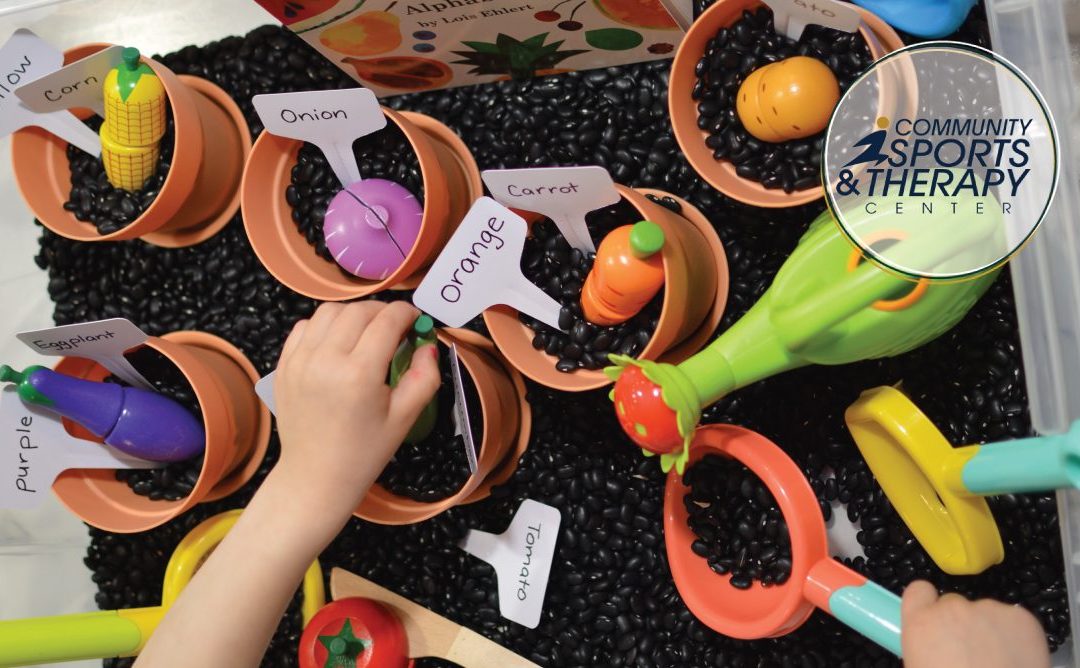Sensory bins offer the perfect hands-on way to allow kids to explore through play.
For kids who struggle with either social skills or play skills, these tactile materials can get them interested in different pretend play scenarios such as “gardening” or “cooking” and more. Sensory bins can be used as individual play, which can help calm and focus a child. They can also be used for team building by filling up a bucket together or finding hidden treasures as a team.
The therapeutic benefits of sensory bins are endless, but here are a few:
Sensory Exploration:
Sensory bins stimulate a variety of senses at the same time, including touch, sight, sound, and smell. Various material can be used for different textures such as dry rice, beans, pasta, pom-poms, water and more.
Fine Motor Skills & Hand Strength:
Children can work on their fine motor skills through scooping, grasping, stirring, and pouring with a variety of tools. These tools may include shovels, spoons, tweezers, tongs, funnels, measuring cups, etc. These encourage tool use and help develop grasp patterns your child needs for activities such as handwriting and using feeding utensils. This can also increase hand strength, coordination, bilateral coordination, and in-hand manipulation
Social & Play Skills:
Sensory bins offer a great opportunity for cooperative play and to develop social skills. When used in a small group of friends or siblings, bins can encourage socialization with peers through exploratory play. Children can learn how to share and take turns, the value of teamwork and cooperation, and how to communicate with others.
Calming Activity:
Sensory bins can provide a quiet activity to help children calm down and play independently. For children who become overstimulated or overly excited by tactile input, a repetitive fine motor activity can sometimes help them regroup and calm themselves. Having a child pick up small objects one at a time and place in a small opening or container is a great way to do this.
Language Development/Academic Skills:
Talking with your child while playing with sensory bins provides endless opportunity to expand language and develop vocabulary. You can work in academic and cognitive concepts by hiding letter or number shapes in the bin, math flashcards, or sight word flashcards. Kids can sort and categorize items they find such as buttons or beads by color, shape or size. Try hiding items with different beginning sounds in the sensory bin and see if your child can find the target sound. There are so many ways to work on alphabet, counting and spelling skills while engaging in sensory play.
From a therapist standpoint, our physical, occupational and speech pediatric therapists cannot say enough about the therapeutic benefits of sensory bins.
Not only do sensory bins make great therapeutic tools to address the obvious sensory processing, they also improve overall attention span. Some children need to develop a specific skill while others may need to develop a combination of skills, and sensory bins can provide the solution. You can easily change up your bins with objects you have on hand, by season, or have your child help in the creation of one—the possibilities are endless!
**It is important to note that children should be supervised when playing with bins to ensure they are not putting small objects in their mouths and playing safely.**
We hope you and your little ones have a blast exploring through play!
If you are concerned with your child’s sensory systems, please speak with your child’s pediatrician or contact Community Sports & Therapy Center’s pediatric therapists at 419-586-2077.

